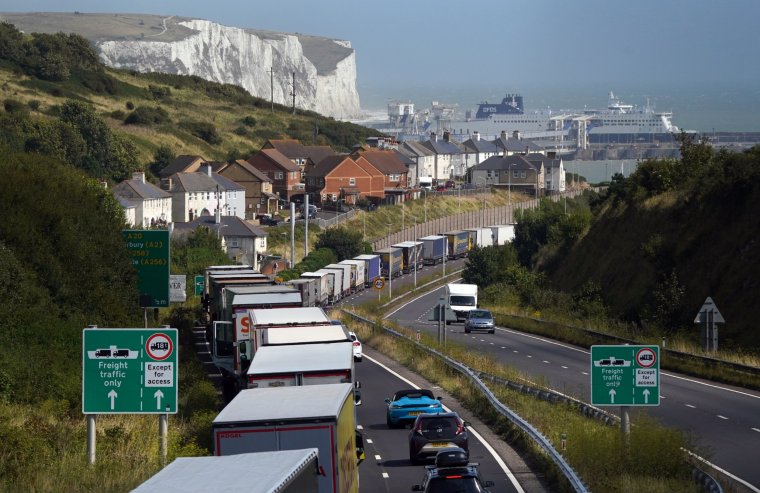Holidaymakers have been warned of long queues over the bank holiday weekend as millions take to the roads and airports.
Travellers have also been advised of rail disruption due to several major engineering works affecting three intercity lines serving London.
This will be the busiest August bank holiday weekend on the roads since at least 2015, according to research by the RAC, with around 19.2 million drivers making leisure trips between Friday and Monday.
Meanwhile, Friday is set to be the busiest day for UK flights so far in 2024 as families enjoy the final chance for a summer getaway before the school term starts, aviation analysis firm Cirium has revealed.
Over the bank holiday weekend, 12,302 flights are scheduled to depart UK airports, equating to more than 2.2 million seats, according to Cirium data. Departure numbers are almost 4 per cent higher than the 2023 August bank holiday, with 3,243 departures on Friday alone.
Heathrow Airport will see the largest number of departures, followed by Gatwick, Manchester, Stansted and Edinburgh, Cirium added.
Airports will be hoping to avoid a repeat of long queues last year when a technical issue in the National Air Traffic Services (Nats) flight planning system grounded planes, affecting 700,000 passengers.
On the roads, transport analytics company Inrix said that the heaviest road traffic was likely on Friday between 10am and 6pm and Saturday between 10am and 1pm.

Travel trade firm Abta estimated that more than two million people would travel abroad this weekend, with Friday projected to be the peak day for departures.
National Highways, which manages motorways and major A roads in England, said it will lift more than 500 miles of roadworks by 6am on Friday until Tuesday to “keep people moving”.
It issued an alert for the M56 and M6 in north-west England as up to 70,000 dance music fans head to the four-day Creamfields festival in Cheshire, which started on Thursday.
Thousands of drivers were stuck for several hours in queues during the event last year.
Roads in Kent will also be busy as many people head to Europe via the ports, with the Port Of Dover expecting more than 20,000 cars over the bank holiday period.
Marshalls Coaches warned drives of “high levels of traffic” and “delays” in Newark, Nottinghamshire, due to the bank holiday and Lost Village Festival.
It comes as analysis showed that roadworks in England have continued to cause record high levels of disruption in 2024.
According to The Telegraph, a third of roadwork projects this year were described by National Highways as having a “moderate” or “severe” impact on traffic – an average of 156 a week.
Moderate delays are defined as between 10 and 30 minutes, while severe delays are half an hour or more.
The same proportion, 32 per cent, was recorded across the whole of 2023 – the highest since current records began in 2015.
Network Rail engineering work means no long-distance services on the East Coast Main Line will run to or from London King’s Cross from early evening on Saturday until early morning on Monday.
This will affect people travelling south returning from the Edinburgh Fringe Festival.
A reduced timetable will be in place between London Euston and Milton Keynes on Saturday and Sunday due to track renewals at Primrose Hill.
Journeys between London Paddington and south Wales will be diverted – taking longer than normal – as engineering work will close the line between Bristol Parkway and Severn Tunnel Junction.
Services will also be disrupted in the Stoke area from Saturday until Tuesday.
Railway companies have also warned of disruption caused by Storm Lillian, set to cause havoc in northern parts of Wales and England.
Gusts of up to 80mph are expected, with travel disruption, flooding, power cuts and dangerous conditions near coastal areas all likely.
Forecasters have advised revellers at Leeds Festival to secure their tents to protect themselves from strong winds of 50 to 60mph.
Met Office forecaster Greg Dewhurst said: “The strongest winds are likely to start forming through the early hours initially across parts of north Wales into the Liverpool, Blackpool area, and then crossing over the Pennines and into the east and north-east England – Yorkshire, up to Northumberland before then clearing out into the North Sea.”
He added: “There could also be disruption first thing to the transport networks for those travelling first thing.”
Lillian’s influence would “wane” by Friday afternoon as it reduced in intensity and pushed off into the North Sea, with scattered showers for most of the rest of the day, Mr Dixon said.
RAC Breakdown spokeswoman Alice Simpson said the adverse weather and large volume of expected trips represented “a perfect storm” for drivers.
The car insurance firm said that 3.2 million leisure trips are estimated to be made on Friday alone.
Ms Simpson said: “Anyone driving in areas impacted by Storm Lilian should try to avoid exposed coasts and higher routes where there’s a greater chance of fallen branches and trees.
“It’s vital to lower your speeds and leave plenty of extra stopping distance to allow yourself time to react quickly.
“Drivers should keep a firm grip on the steering wheel and take extra care when passing high-sided vehicles which can cause an unnerving buffeting effect when you’re suddenly hit by the wind on the other side.”
Network Rail is “closely monitoring” how the storm might impact the rail network, a spokesperson said.
“We have teams on hand to put in appropriate measures, if necessary, to ensure that we can continue to run trains safely and as reliably as possible,” they added.



Maurice Saatchi: I used to adore capitalism – then I had lunch with Margaret Thatcher